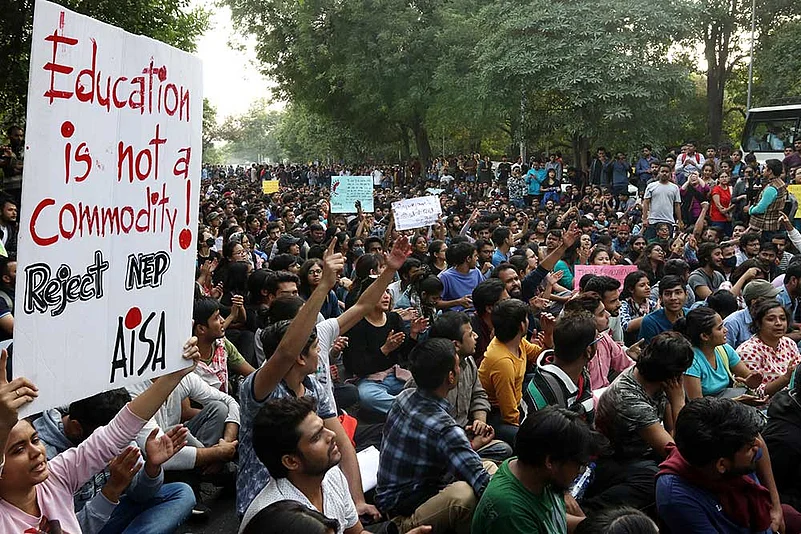I have often said with a sense of national, not just individual, pride that I never studied abroad, but I have taught abroad. This sense of confidence in one’s academic capabilities is what JNU imparted to my generation. As students, most of my generation chose not to apply for admission to a foreign university. JNU was good enough. Studying at an Indian university rather than abroad was our concept of nationalism. This is worth emphasising when hundreds of thousands of Indian students are spending upwards of US$6 billion annually in tuition fees paid to all manner of institutions around the world, running away from an increasingly unsatisfactory higher education system in India. Foreign universities are busy selling admission to educational courses abroad in the Indian marketplace.
In the depressive milieu of incompetence, casteism and greed for money in higher education, JNU stands out as a beacon of hope for many, offering good quality education at an affordable cost. It is still a national brand that enjoys value in the market for research, for jobs in government and, indeed, for further education abroad. In 2015, the Union ministry of human resource development constructed a National Institute Ranking Framework (NIRF) and ranked all publicly funded institutions of higher education. The Indian Institute of Sciences, Bangalore, topped the list, followed by JNU. This means JNU is the No. 1 university in social sciences, arts and humanities. It has retained that rank through the past four years of the motivated campaign against it. It is, therefore, unfortunate that instead of strengthening a national brand, a systematic campaign has been launched in the name of nationalism to tar the image of a premier public institution.
Given the manner in which JNU has been targeted by many in the present ruling dispensation, it would seem we have cut our nose to spite our face. JNU, as indeed any university campus, would always be home to intense ideological contestations. That in itself should not be a cause of concern. After all, that very campus has produced students like Nirmala Sitharaman and S. Jaishankar, who adorn the Union council of ministers as its more talented members.
True nationalism demands that Indian public institutions are academically strengthened and financially provided for. There could be a good reason why JNU authorities wish to raise the fees charged for both tuition and facilities. This could easily have been done in a consultative and gradual manner so a single batch of students is not suddenly inconvenienced. It is the institution’s ham-handed management rather than any matter of high principle that has brought the university to the current impasse. No wonder the government has expressed its lack of confidence in the current leadership by appointing a high-level committee to find ways for restoring normality.
The source of the impasse lies in the rise to prominence of mediocrity in the university’s governance systems. This is a general problem of most public universities. As a university rated by the Union government as being at the very top of publicly funded institutions, JNU deserves world-class academic and administrative leadership, not an ideologically over-enthusiastic mediocrity.
The option of going abroad for higher education is open only to the economically better-off sections. Those who can afford to pay for private education at home or abroad are anyway migrating. It is only those who cannot afford to migrate or still have that sense of belonging at home that choose to study in Indian public universities. The reform of governance at public universities is, therefore, a challenge that must be grasped sooner than later if a growing number of young Indians are to be discouraged from migrating. Those who celebrate the success of the ‘great Indian diaspora’ should reflect on whether migration is a greater act of nationalism than staying at home and demanding better and more affordable education?
(The writer, a former advisor to PM Manmohan Singh, is a political commentator and policy analyst. The article has been written by him on invitation.)


























